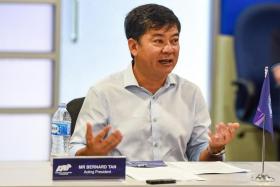'Jackpot earnings must go back to local football'
FAS to draw up a set of member obligations for its affiliates to uphold integrity of the game
In the lead-up to the Football Association of Singapore (FAS) election in April, the revelation that amateur club Tiong Bahru FC posted a revenue of $36.8 million last year sent shockwaves through the local football fraternity.
Many wondered how a National Football League club could rake in a revenue that is higher than even FAS' budget of $35.8m in the same period and whether enough of the revenue was being channelled back to Singapore football.
Just over a month after taking office, the new FAS council have moved to try and regulate local clubs that own jackpot operations.
In a media release sent to the press yesterday, the FAS announced a list of measures that it hopes will improve the governance at the FAS and in Singapore football in general.
While FAS vice-presidents Bernard Tan and S. Thavaneson admitted permits for jackpot operations are handed out by the police, the national football body is trying to rein in the governance of clubs that run such operations.
Said Thava, chairman of S.League club Balestier Khalsa and amateur side Balestier United: "All profits from jackpot revenue must go back totally to (local) football.
"Not just a percentage of it."
The Straits Times reported that about $31m of Tiong Bahru's revenue was paid back in jackpot winnings and taxes. Its income was therefore around $5m.
With a surplus of $698,804, this means the club, which do not pay the salaries of their amateur players, spent more than $4.3m.
In comparison, a typical S.League club - a professional outfit with salaried players and a clubhouse - operate on a budget of around $2m a year.
Tan, who led the ad hoc committee that looked into FAS' internal governance issues, said: "The FAS is a charity, not a statutory board that can impose regulations by law.
"So, what we can do is have member obligations."
The release stated that these obligations, which Tan's committee are developing, are meant "to ensure that (FAS members and affiliates) are able to uphold the integrity of the game and do not bring it to disrepute".
They include guidelines on the composition of management committees, decision-making powers and commitment to financial prudence.
There are "additional requirements" for clubs that run jackpot operations. They include commitments to social responsibility and the use of proceeds to enhance football in Singapore.
Tan explained that the FAS' 44 affiliates could be categorised into three tiers.
In the top tier will be S.League clubs and clubs that run jackpot operations, since they are recipients of funding from FAS and, therefore, will be under greater scrutiny.
SOLVENCY PROBLEMS
In the middle tier will be most amateur National Football League clubs, while in the bottom tier will be members that do not receive any funding or grants and will be engaged with "a light touch".
Said Tan: "We are happy to do this in dialogue with clubs and member associations, because there is an intention from the whole community to say, 'We cannot let this happen again'."
He was referring to the police raids that took place at three football clubs and FAS' headquarters, and the subsequent investigation, following the revelation that Tiong Bahru had donated $500,000 to regional football body Asean Football Federation through the FAS.
The FAS council also said the obligations to financial prudence were meant to keep clubs' spending in check.
Said Tan: "We are very worried clubs take on liabilities beyond their ability (to pay) and raise solvency problems going forward."
One such club in a money muddle at the moment are S.League side Tampines Rovers, who ran into cash-flow problems last year.
TNP also reported last week that the Central Provident Fund (CPF) Board was looking into the club, with former sponsor Komoco Motors recalling a $190,000 loan.
Tampines are also facing a repayment of a $756,000 "sponsorship credit line" from Taiwanese tech company Nogle, starting next year.
Without referring to Tampines, Thava said: "In most cases, that negative liability goes to the chairman.
"But if it is a case of external liabilities, where the club can be sued... That's an area where we have to ask club management: How do you intend to settle this?
"That is critical. You cannot have clubs just spending, not knowing where the money will come from.
"Then, halfway through the season, you can't pay wages... Then what happens? The contracts are there."
Get The New Paper on your phone with the free TNP app. Download from the Apple App Store or Google Play Store now



